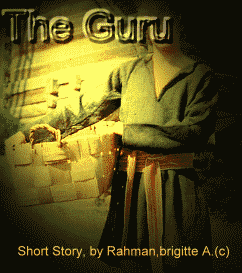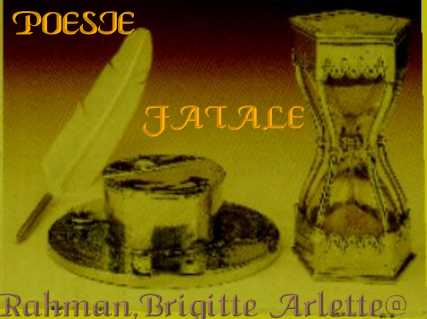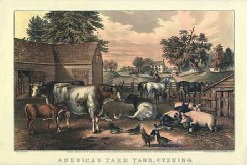The Guru
VOWS OF SILENCE©
Rahman, Brigitte Arlette
It's four in the morning at a countryside Ashram in England. It's cold, and the hens and roosters in strident symphony are sending their wake-up call to the dawn. The animals in their sheds are slowly waking, rising from their profound sleep, their near-death of the night. The men, flat on their backs, still helpless between waking and sleeping are yawning, heedless of their short, vulnerable lives. Now the animals are awake, exposed and unprotected from predators and butcher knife alike. The seat of slaughter, the bed of murder, this was the last night before a spiritually awakened life.
Slowly, shivering silhouettes in saffron emerge from the darkened house holding galvanized buckets in their hands. Soon each shadow is busy looting, poaching booty from the animal family's treasure of eggs and milk to bring to the still darkened lodge. Shortly afterward a gong is heard, a loud, compact and oppressed sound. Lights are switched on though dimmed by the emerging day. Everyone, young men with shaved skulls, fat women, and children with hair still undone by sleep, come limply to the middle of the yard and gather by the well.
One matronly woman primes the pump until the water starts rhythmically flowing. All cup their hands for water, splash and quickly wash their sleepy faces. The slap and bite of the freezing water immediately make their faces flush crimson. Some have simple Kashmir shawls of dull grey or brown draped around their bodies like blankets. The little ones keep close to the thighs of their mothers, enveloped within the folds of their shawls. Only one knee-high pair of blue eyes and tiny toe nails in leather sandals can be seen peeping from within the shawls.
Soon, thirty-eight believers finish their morning ablutions and one by one, like a slow train starting for a faded grey, empty station, they return to the lodge. The older woman stops pumping and locks the pump with a key whose brutal silver glint clashes with the soft saffron colour of her dress. Everyone else is sitting in the meditation room; their throats dry from the long night's sleep. They wait like patient sheep for their shepherd to take them to the lush pastures where they will graze in meek, naive faith.
It is very cold and as the matron enters she turns on the light, closes the door and switches on the heater. She picks two helpers and tells them to follow her to the kitchen. Except for the baskets of eggs and the buckets of warm steaming milk left on the wooden table, the kitchen has a barren look. A huge pan of water is boiling on the stove to which she adds rose water followed by a lovely aromatic rose from a vase. Mercilessly she tears off its petals and throws them into the pan. The kitchen soon fills with a fragrant vapor. The helpers, meanwhile, put ladles into the buckets of milk and begin frying eggs, adding slices of banana and apples to the batter.
The gong is heard for the second time today. The matron pours the steaming rose water into a silver bowl half filled with cold water and checks it with a thermometer. Yes, just right. She checks her hair in the reflection of the water and sees that it is good. She reaches for a fresh ivory towel with the initials YM on it and carries the silver bowl toward the meditation room. The helpers open the door and the morning procession begins.
They enter the main room. On an elevated seat set on a raised platform decorated with cushions of finest Asian workmanship, carpets and garlands of flowers, sits a motionless man posed in the lotus position. His legs are crossed, the soles of his feet touch his open palms. He is obese, his hair and beard jet black, long and thin. He, too, wears a saffron robe but of a heavier, finer cloth. He has around him a white shawl embroidered with gold leaves. His eyes are closed in trance.
The matron gently goes to him and says, "Guru, here is the water" and places it on the rosewood table beside him.
Slowly he opens his eyes and dips his little finger into the water. Yes, the temperature is as it should be. He nods his head and the matron motions the two helpers to raise the silver bowl. Slowly the Guru lowers his head into the rose water and opens his eyes several times while inhaling the water. He raises his head, circulates the fragrant water in his nose and again puts his head into the basin. This time he releases the water through his left nostril, reopens his eyes and swallows the rest. One more time he raises his head, gargles the rose water, drops into the basin, reopens his eyes and, finally, releases the polluted stream.
His purification rites are over. The students sitting at his feet reverently follow his morning ritual, and each day they feel the same calmness come over them. Shivering, they follow the warm water coursing down their respected Guru's beard. The journey of the warm water on the Guru's face is in itself a soothing fairy tale to their cold flesh. With him they feel the warm, soothing water. It is hypnotic. They rise, floating above their human condition, rise out of their mortal bodies, reaching for the elusive warmth of that watery journey. Then their Guru starts the Mantra. For one hour the walls of the lodge resound with their mantric chanting, a piercing chant that disturbs the animals. The cows, the hens, the birds respond with their own shrieking cries.
The gong rings again and the helpers bring out the milk and the curried eggs and serve each person with a banana leaf on the floor. Using the ladles, everyone drinks directly from the buckets of fresh warm milk. This is not a ritual and they dispense with it quickly. The Guru never eats with them. He simply watches. No one has ever seen him eat, no one knows where he eats or whether he eats at all. All they see is that his cheeks are plump and that he is fat.
The gong rings once more with a new severity and the Guru speaks. In a muted voice he says, "Devotees, today we concentrate on silence. Today, no one speaks...not a word, not a syllable, not a sound. Speak and you will be punished and left without food for a week. Except for children under five, today is a Day of Silence.
With their task set, a deathly silence settles over the lodge. Only the routine sounds of work and the noise from the animal sheds can be heard. The women, the acolytes, everyone goes about their duties: gardening, studying, cleaning...and not a voice is heard.
This day of the week is set aside for washing their saffron robes. One by one the women go to the well and pump the water they need. On cold days washing robes is a good duty. It keeps the women active, their blood racing and their bodies warm. And today is a very cold day indeed.
They bring their buckets, their rough soap and stones and start the hard chore of removing stains. Soon their hands are blue from the cold, while steam can be seen rising from their lips and nostrils. With each breath a little warmth is lost. The colder they feel the harder they wash...and it is very cold.
There's no noise from the children over five years of age. They know it is wrong to speak and do not utter a sound. They are well trained and behave like sad little puppets.
Everybody works in silence, contemplating, trying to forget the cold and the freezing water biting their fingers and toes. Soon enough, though, their task is done and the women go to hang the wet robes on lines strung between the lean tall trees.
There's no noise except the flapping wings of frightened birds as they approach...that and the quiet sound of squirrels climbing, scampering away high in the trees. The dry autumn leaves complain and crackle under their steps. It's 9 AM and in the sky, heavy gray and white clouds hide the sun.
As they are hanging the clothes, one of the women, Rajuna, looks around to see that her children are near. Yes, Anju and Raju are here helping out with their stern little faces, but she does not see Pradeeb. She looks everywhere, but he's nowhere to be found.
But she does not call. The Guru's order is sacred so she leaves everything and runs back to the well. She has a feeling, an evil premonition.
And there he is, five years of little blond boy and blue eyes. The Adventurer they call him. He has turned the bucket upside down and is climbing onto it next to the open well. Rajuna wants to call his name, make him look her way, but the Guru has ordered silence today. Nothing can be spoken aloud. If the vow of silence is broken for any reason, terrible things will happen. If she calls out maybe tragedy will come to her son.
No, she will not think of that now. She cannot think at all. Yes, it is best to follow the Guru's order. The vow of silence truly is sacred. In the Ashram he is known as a man of great wisdom. He is above everybody and is worshipped as a deity.
She runs, tears streaming down her cheeks, seeing her son through a veil of tears. She feels herself struggling, spiritually at war. Should she break her vow of silence? Should she...can she disobey? If she breaks the vow of silence, surely something bad will happen. She cannot think. She feels her heart begin to break as she sees Pradeeb, her beautiful child, lift his little leg over into the void of the well.
Should she call, scream, break the vow of silence?
Her mind races and still she cannot think: If she does, the Guru said a great punishment would follow. So with her heart screaming, "NO", she watches in silence as her precious Pradeeb lowers his second tiny leg into the well. She runs, oh how how fast she runs...but she is too late As she watches, as she runs, her little boy slips into the void.
She watches him fall like a tiny puppet whose strings have been cruelly and unexpectedly cut. He doesn't scream. He doesn't utter a sound. Pradeeb, her son, her bright shining sun, was listening when the Guru ordained his Day of Silence.
Stunned and disbelieving, she cannot move. All day she remains by the well and sheds quiet ceaseless tears. Because it is the Day of Silence no one misses her. Fearing friendly words or meetings that might start a discussion or spark a greeting, everyone works alone in separate areas.
True to her vow, Rajuna does not utter a sound. She sits in wet silence....
That evening, as in every other evening, everyone gathers in the meditation room. The Guru supervises the evening meal as he will the chanting.
As they assemble, the gong sounds and the Guru starts to speak. "Now you see how easy the Vow of Silence is. Our house is protected and we are saved from evil. Because the word is all powerful, so, too, is the silence. Refraining from talking today has saved us from evil."
As they sit to eat and talk, the Guru notices that Rajuna does not speak. Her face is downcast and she does not eat. He chides Rajuna in a harsh voice, "Rajuna, do not try to be better than others, the vow of silence is over, you can speak. Speak now."
She doesn't answer; no words will come. All the words in her have died. She gets up, goes to pack her few belongings and leaves without a word, never to return.
The next morning the Guru enters in his usual fashion, undisturbed, and proceeds with ordering the affairs of the day. As he does, he concludes by saying, "Yesterday was a day of silence. We know that Rajuna has left because she did not obey me. She cried and crying is expression in itself. It was wrong of her. She let her tears talk and her little boy was trapped in her own selfishness and disobedience. Evil came and took away this boy before his time, sooner than if she obeyed me. Make no mistake, a cry, even a tear is a word. He died and she brought this upon herself. Now, here are the new instructions." And they believed.
~~~~~~~~~~~~~~~~~~~~~~~~~~~~
His voice was lost in the wind that blew outside the Ashram and Rajuna was already far away. Here, outside, this was the last place her voice had been heard. There, inside the walls a web, a golden mesh of faith, a pretty lace to veil the net of evil; there, in blind conviction was their sin. There, she thought, in the sacred Ashram was a silence as deadly and as final as the tomb.
Rajuna has paid the price, and will pay dearly everyday, until her last setting sun and she neglects to return, and her last walk out brings release. Her punishment, her reality now, is a life as dark, alone, and impassive, as unforgiving and barren, and as joyless as the grave. She understands and accepts. In a tongue still one rule shy of consummation, not until death will she speak, when there are words with the sweep and fidelity able to speak immortal truth. But not now, not yet, not until she is free from the clutch of shallow shepherds and their exalted ambitions, and the blind, giddy acceptance of their willing, spiritual sheep.
My short stories are based on real life events, believe it or not.











